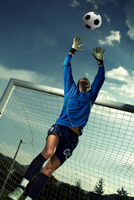|
 Concussion: signs and symptoms
Concussion: signs and symptoms
By Eric Warren, MD, Novant Health Waxhaw Family & Sports Medicine
Sports injury?
Call 704-316-SPRT (7778) |
As a busy sports medicine doctor, I spend a large part of my day seeing patients with concussions. They span all ages and come from all walks of life, from athletes and children to adults who have car- or work-related accidents.
There are nearly four million concussions each year in our country alone. Though anyone can suffer a concussion, most of the concussion patients I see are athletes. This is due to several factors:
- More and more people are playing sports.
- Athletes are bigger, faster and stronger than they’ve ever been. Today’s training methods are more sophisticated, and the options for protein and nutrition are seemingly endless and abundant. This leads to more violent collisions.
- Parents and athletes are better educated than ever about the signs and symptoms of a concussion as well as the importance of getting evaluated — and this makes me happy.
 So, what are the signs and symptoms of a concussion? So, what are the signs and symptoms of a concussion?
First, for a concussion to happen, a force must be transmitted to your brain. This force can be a direct blow to your head or a blow elsewhere in your body that travels to your head. If that happens, and you’re awake and can talk, it’s helpful for someone to start asking you what and how you’re feeling.
Here are some of the symptoms:
- Headache and dizziness are, by far, the most common symptoms; each is present roughly 80 percent of the time.
- You can also have:
- Ringing in the ears
- Nausea
- A dazed and confused feeling
- Irritability
Historically, people thought you had to have loss of consciousness (a.k.a. “get knocked out”) to have a concussion. But loss of consciousness is only present about 10 percent of the time. That means that 90 percent of the time, even if you have suffered a concussion, you have NOT been knocked unconscious. Here’s a little-known fact: it’s more common to have nausea (and sometimes vomiting) — roughly 15 to 20 percent of the time — than loss of consciousness. It’s even possible to have convulsions, which can look like a seizure.
Additionally, many people often don’t realize that concussions can cause some symptoms that appear later — sometimes DAYS later, such as:
- Fatigue
- Difficulty falling asleep
- Sadness/depression
Many patients arrive in my office with fatigue, sleeplessness and/or depression days or weeks after suffering a concussion. These symptoms can take a while to resolve.
The biggest thing I tell coaches, athletic trainers, parents and even other doctors when I teach at conferences is that when a concussion occurs, recognizing the signs and symptoms is more important than ANYTHING else you can do for that athlete. That’s because we’ve learned that if an athlete continues to play with a concussion, it can be disastrous — even fatal. Things like second-impact syndrome and long-term effects on memory and brain function can be prevented by simply identifying that a concussion may be present and pulling the athlete from competition. That — and connecting with a specialist experienced in managing concussions — is 90 percent of the battle.
Dr. Warren is a board-certified sports medicine and family physician at Novant Health Waxhaw Family & Sports Medicine. To find an expert in concussion and other sports medicine services near you, call Novant Health Sports Medicine at 704-316-SPRT (7778). |

